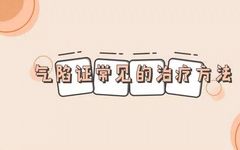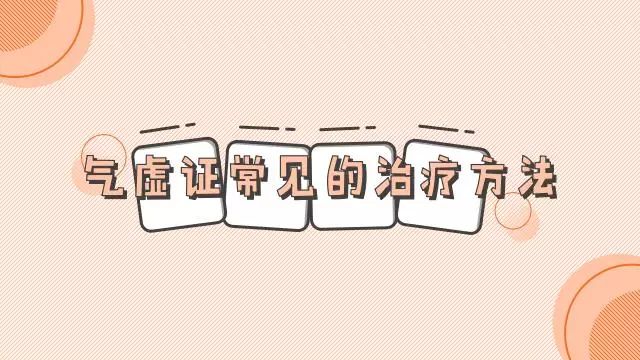
Common Treatment Methods for Qi Deficiency Syndrome
(1)Yiqi Gubiao Method (益气固表法): This method is suitable for patients with lung Qi deficiency and weak defensive Qi, characterized by loose pores, spontaneous sweating, aversion to wind, and susceptibility to colds. The formula is similar to Yu Ping Feng San (玉屏风散). According to the “Jing Yue Quan Shu”, “spontaneous sweating is due to Yang deficiency and weak pores, which are governed by the defensive Qi. When the defensive Qi secures the exterior, if it is weak, the exterior becomes deficient, leading to spontaneous sweating, and fluids are discharged. The treatment should focus on strengthening the exterior and tonifying Yang.” The Yiqi Gubiao method is often supplemented with astringent and warming Yang methods, such as using Mu Li San (牡蛎散) to astringe and stop sweating, and Qi Fu Tang (芪附汤) with Fu Zi (附子) to restore Yang.
(2)Bu Yi Lung Qi Method (补益肺气法): This method is suitable for chronic cough and asthma, with symptoms of shortness of breath, low voice, fear of wind, and susceptibility to colds due to lung Qi deficiency. The main herbs used are those from the Astragalus genus. The earth can generate metal, and nourishing the mother can lead to fruitful offspring, hence lung tonification often combines with spleen tonification, referred to as the Pei Tu Sheng Jin method. The lung is the master of Qi, and the kidney is the root of Qi; thus, chronic lung disease often affects the kidney, necessitating simultaneous tonification of both.
(3)Pei Bu Zhong Qi Method (培补中气法): This method is suitable for spleen and stomach Qi deficiency syndrome, clinically presenting with fatigue, pale complexion, low voice, shortness of breath, and loose stools. The basic herbs include Huang Qi (黄芪), Dang Shen (党参), Bai Zhu (白术), Fu Ling (茯苓), Shan Yao (山药), and Bian Dou (扁豆), with Si Jun Zi Tang (四君子汤) as the basic formula. According to the “Yi Men Fa Lü”, “the spleen is the source of Qi and blood transformation; when Qi is insufficient, one becomes weak and reluctant to speak, indicating a deficiency of Zheng Qi… It is advisable to tonify with sweet herbs, as sweet herbs promote growth and nourish the center, irrigating the organs and meridians with beneficial medicine.”
(4)Wen Bu Kidney Yang Method (温补肾气法): This method is suitable for kidney Yang Qi deficiency syndrome, with symptoms including hearing loss, shortness of breath, cold extremities, nocturnal emissions, premature ejaculation, clear and frequent urination, and weakness in the lower back and knees. Sweet and warming Qi tonics are primarily used, avoiding cool and dispersing herbs, known as “nourishing the source of fire to dispel Yin shadows.” While warming kidney Yang, it is also important to nourish kidney Yin, seeking Yang within Yin. For example, Jin Gui Shen Qi Wan (金匮肾气丸) is based on Liu Wei Di Huang Wan (六味地黄丸) for nourishing Yin, with the addition of Fu Zi (附子) and Rou Gui (肉桂) to warm and tonify Yang Qi. If the vital Qi is about to collapse, a large dose of Ren Shen Fu Zi Tang (人参附子汤) should be urgently administered to protect the original Yang of the kidney. The kidney is the foundation of storage; if kidney Qi is not secure, storage fails, and it should be combined with methods to astringe kidney Qi, commonly using Shan Yu Rou (山萸肉), Shan Yao (山药), Long Gu (龙骨), Mu Li (牡蛎), Qian Shi (芡实), Lian Zi (莲子), and Jin Ying Zi (金樱子).
(5)Tong Bu Yang Qi Method (通补阳气法): This method is suitable for chronic diseases that have progressed to a stage where Yang Qi deficiency and obstruction are prominent. Yang Qi is essential for life; “if obtained, it is bright; if lost, it is not manifest.” This method warms and tonifies Yang Qi while promoting its flow, which can alter the relationship between Zheng and Xie, often reviving chronic conditions. The first choice of herbs includes Fu Zi (附子) and Xi Xin (细辛), with formulas such as Ma Huang Fu Zi Xi Xin Tang (麻黄附子细辛汤) and Fu Zi Tang (附子汤).
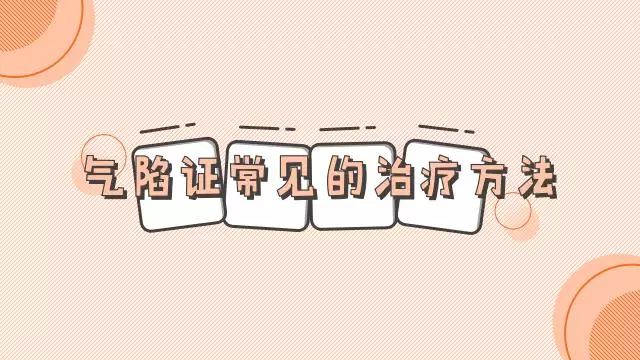
Common Treatment Methods for Qi Sinking Syndrome
(1)Sheng Ti Zhong Qi Method (升提中气法): This method is primarily suitable for Qi sinking syndrome, clinically presenting with shortness of breath, reluctance to speak, uterine prolapse, excessive menstruation, prolonged dripping, excessive leukorrhea, urinary incontinence, rectal prolapse, and fetal restlessness. The Sheng Ti Zhong Qi method is based on tonifying Qi and strengthening the spleen, combined with lifting herbs such as Sheng Ma (升麻) and Chai Hu (柴胡), with representative formulas like Bu Zhong Yi Qi Tang (补中益气汤) and Ju Yuan Jian (举元煎) to tonify the spleen Qi and lift the sinking Yang Qi, restoring normal Qi dynamics.
(2)Sheng Bu Zong Qi Method (升补宗气法): This method is primarily suitable for Zong Qi sinking syndrome, clinically presenting with palpitations, chest tightness, insufficient Qi for breathing, exacerbated shortness of breath with movement, edema, and a slow pulse, which may be intermittent or irregular. The Sheng Bu Zong Qi method commonly uses herbs such as Dang Shen (党参), Huang Qi (黄芪), Man Jing Zi (蔓荆子), Sheng Ma (升麻), Chai Hu (柴胡), and Bai Zhu (白术).
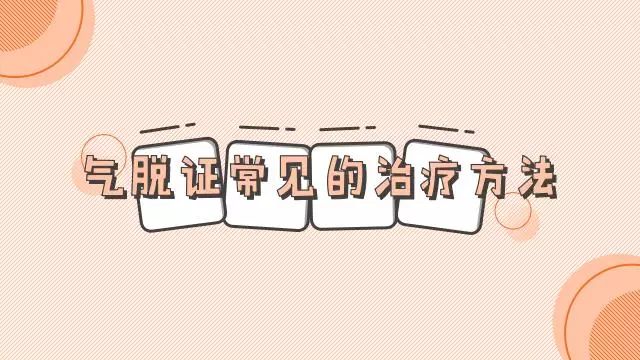
Common Treatment Methods for Qi Collapse Syndrome
(1)Gu Biao Zhi Han Method (固表止汗法): The lung is associated with the skin and hair; when lung Qi is deficient, pores are loose, and defensive Qi is weak, spontaneous sweating occurs. The treatment should primarily focus on tonifying Qi and securing the exterior, commonly using Yu Ping Feng San (玉屏风散) combined with astringent herbs such as Wu Wei Zi (五味子), Nuo Dao Gen (糯稻根), Duan Long Gu (煅龙骨), and Duan Mu Li (煅牡蛎).
(2)Lian Lung Zhi Ke Method (敛肺止咳法): This method is suitable for chronic cough due to lung deficiency, with little or no phlegm, and Qi deficiency leading to potential collapse. This method combines lung Qi tonification with astringent cough-stopping herbs such as Wu Wei Zi (五味子), He Zi (诃子), and Ying Su Ke (罂粟壳). Clinically, it is important not to use astringent lung Qi tonics alone; phlegm-transforming herbs should be added to prevent excessive astringency, making it difficult to expectorate phlegm.
(3)Gu Jing Suo Niao Method (固精缩尿法): This method is suitable for kidney Qi deficiency, leading to urinary incontinence, frequent clear urination, nocturia, and symptoms of premature ejaculation. For kidney Qi deficiency and bladder dysfunction leading to abnormal urination, tonifying kidney and securing the foundation herbs should be combined with Sang Piao Xiao (桑螵蛸), Yi Zhi Ren (益智仁), Fu Pen Zi (覆盆子), and Shan Yao (山药) to reduce urination, with formulas like Suo Quan Wan (缩泉丸) and Sang Piao Xiao San (桑螵蛸散). For premature ejaculation due to weak essence, tonifying kidney herbs combined with Long Gu (龙骨), Mu Li (牡蛎), Qian Shi (芡实), Jin Ying Zi (金樱子), and Lian Xu (莲须) are commonly used, with formulas like Jin Suo Gu Jing Wan (金锁固精丸).
(4)Se Chang Zhi Xie Method (涩肠止泻法): This method is suitable for spleen and kidney Yang deficiency, leading to chronic diarrhea and dysentery, with symptoms of loose stools and rectal prolapse. Clinically, in addition to using Bai Zhu (白术), Gan Jiang (干姜), Fu Zi (附子), Bu Gu Zhi (补骨脂), and Rou Dou Kou (肉豆蔻) to warm and tonify the spleen and kidney, it is also combined with Shan Yao (山药), Qian Shi (芡实), Lian Zi Rou (莲子肉), Chi Shi Zhi (赤石脂), Yu Yu Liang (禹余粮), Wu Wei Zi (五味子), and Ying Su Ke (罂粟壳) to astringe and consolidate the intestines, with representative formulas like Zhen Ren Yang Zang Tang (真人养脏汤).
(5)Gu Jing Zhi Dai Method (固经止带法): This method is suitable for Chong Ren instability, leading to excessive menstruation, continuous bleeding, and excessive clear leukorrhea. Clinically, while tonifying Qi, strengthening the spleen, and benefiting the kidney, astringent herbs for stabilizing menstruation and stopping leukorrhea, such as Di Yu Tan (地榆炭), Ce Bai Ye Tan (侧柏炭), Wu Bei Zi (乌贼骨), and Wu Bei Zi (五倍子), are used, along with astringent herbs like Shan Yao (山药), Qian Shi (芡实), Chun Gen Pi (椿根皮), Long Gu (龙骨), and Mu Li (牡蛎), with formulas like Gu Chong Tang (固冲汤).
(6)Bu Qi Gu Tuo Method (补气固脱法): As the disease progresses, due to excessive evil or deficiency of Zheng Qi, or due to improper use of sweating or purging, or excessive sweating or purging, or even massive bleeding, there can be a sudden loss of Yin fluids, leading to excessive loss of Qi along with fluids and blood, resulting in a violent collapse of Yang Qi. At this time, the treatment should prioritize tonifying Qi and securing against collapse, commonly using large doses of Ren Shen (人参) and Huang Qi (黄芪), with formulas like Du Shen Tang (独参汤) and Sheng Mai San (生脉散).
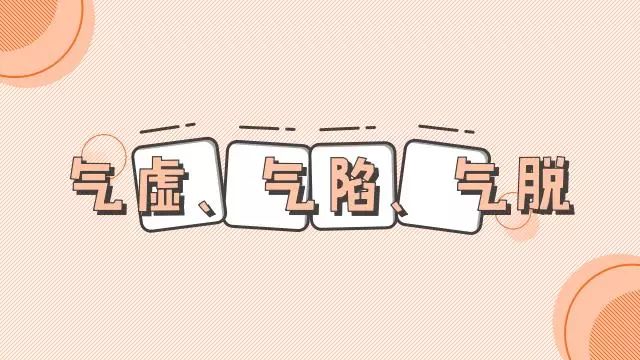
⊙ The content of this article is for clinical reference only; non-TCM professionals should not attempt to self-medicate.
⊙ The images and text content are sourced from the internet; please contact us for removal if there is any infringement.

